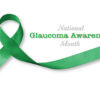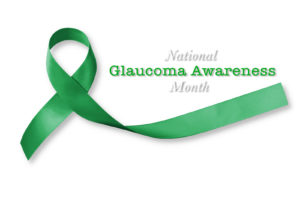
January Is National Glaucoma Awareness Month
Did you know that January is National Glaucoma Awareness Month? As the new year kicks off, one important resolution is to learn more about this disease and what we can do to prevent it, both for ourselves and for our loved ones.
Glaucoma is a dangerous disease, largely because its symptoms onset suddenly. This is because there are very few warning signs (if any). Glaucoma causes a pressure build-up in the eye, permanently damaging the optic nerve. This can sometimes lead to severe vision conditions, including blindness.
 Don’t let it take you by surprise. This month, learn the risks of glaucoma and how to prevent it to live a healthier life.
Don’t let it take you by surprise. This month, learn the risks of glaucoma and how to prevent it to live a healthier life.
Types of Glaucoma
There are two main types of glaucoma: open-angle glaucoma and angle-closure glaucoma. Though there are two types, the cause of each type is the same – your eye is unable to drain fluid in the eye that needs to be drained.
The more common of the two types is open-angle glaucoma, which is sometimes called wide-angle glaucoma. In this case, the draining mechanisms in the eye look normal, but for one reason or another, they do not drain the fluid as it should.
Angle-closure glaucoma is caused when the structure of the drain path between the iris and the cornea is too narrow. This type of glaucoma is more common in Asia than in the Western Hemisphere. Because of the structure of their eyes, people of Asian descent also experience more farsightedness and cataracts because fluid can build up quite suddenly.
Glaucoma Causes
Though it is easy to assume that glaucoma is a disease reserved for the elderly, it can be caused by a number of factors and affect anyone at any age. However, it is true that mainly the elderly develop this disease.
The reason for this is unknown for now, but many doctors believe it is because of genetics. Often, parents of those with glaucoma also had glaucoma. This is why it is so important to share your family’s eye health history with your eye doctor.
Aside from being hereditary, glaucoma can also be triggered by traumatic events in the eye such as being bluntly hit, severe eye infections, chemical injuries, blocked blood vessels, and inflammatory-related issues.
Though the causes mentioned above are rare, they do happen. That’s why it is important to protect your eyes in every situation. If your eyes have been through something traumatic, you should ask your doctor to test them for signs of developing glaucoma.
Who Is at Risk?
Anyone can develop glaucoma, but some people are more predisposed to it, according to doctors:
- Adults over the age of 40
- Those of Hispanic, African, or Asian (mostly Japanese) decent
- Those who are nearsighted or farsighted
- Those who have sustained severe eye injuries
- Those with diabetes and high blood pressure
If you match any of the criteria listed, you are at risk of developing glaucoma. Get a comprehensive eye exam to know if you’re showing signs of early glaucoma. It’s important to go in for your eye exams regularly since glaucoma can progress undetected. Your eye doctor will know what to look for long before you notice any symptoms.
Glaucoma Treatment
Unfortunately, there is no cure for glaucoma, but if you catch it early enough, there are some treatments to stop the progression of glaucoma.
The two most common and the least invasive treatments are eye drops and medication. Both these treatments work to keep the intraocular pressure in the eye regulated and draining at a normal rate.
Sometimes both pills and eye drops will be prescribed to work together to keep intraocular pressures leveled.
Surgical options also exist for more advanced glaucoma. However, the risks surrounding surgery pose a danger to your overall health and the outcome is not always worth it. Glaucoma can sometimes come back after being surgically corrected or cataracts may begin to form.
Glaucoma Awareness
There are many ways to prevent glaucoma from developing in your eyes. This January is the perfect time to begin taking the right steps toward glaucoma awareness so you can prevent the disease. Don’t have a resolution yet? How about preventing glaucoma? We think this is a resolution you’ll want to keep.
The best way to prevent glaucoma is to get regular eye exams. Early detection may be the key to preventing and slowing the progress of glaucoma if it had already begun. Glaucoma is very difficult to spot as an individual. You may experience eye pain or loss of vision, but by then it may be too late for treatments.
Glaucoma can come on seemingly suddenly, but it isn’t sudden at all. It’s a slow progression that shows no signs or symptoms. So really, the only way to know if you have glaucoma is to have your eyes examined.
Regular Exercise
Exercise has been linked to lower intraocular pressure in the eyes. Studies show that jogging or walking three times a week can help to keep the pressure in the eye low. Yoga and other low-intensity workouts can also benefit your eyes to help prevent glaucoma.
However, if you decide to take up yoga, avoid practicing positions like headstands and handstands for too long, as they might increase pressure in the eyes. If your mobility is limited or suffer from other physical conditions, talk to your doctor about finding exercises that are right for you. The most important thing is to find some way to get your body moving regularly.
Protect Your Eyes
Proper eye protection can save your eyes from severe injuries which can lead to glaucoma. Protection means wearing the proper eyewear for sports, outdoor activities and other activities where objects may injure the eyes. It’s also important to wear sunglasses outdoors to protect your eyes overall.
Resolutions are often abandoned by February, but with a resolution as easy as preventing glaucoma, there’s no reason why these good habits shouldn’t be pursued all year round. So get up to speed on glaucoma awareness and start the year off right with healthy eyes!
Our Rebuild Your Vision Ocu-Plus Formula Contains All 17 Vitamins, Minerals, and Herbal Supplements to Protect Against Glaucoma!





Thanks for this information.
Thanks for the information
Why is there not a cure for glaucoma?
It is all very well saying prevention is the answer but for some of us (including me) , eyedrops and surgery have not been enough. I’ve been taking eyedrops for years but glaucoma has still damaged my retina.
I Will Take Care And I Will Inform Others Also.
my wife has glaucoma .it has effected one eye .please how can we protect the other eye.
Thank you. Homeopathically can help too.
Thanks
Very informative